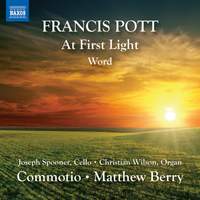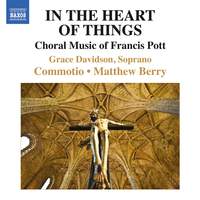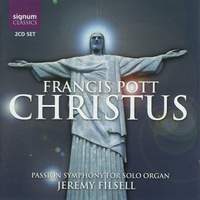Interview,
Francis Pott on 'Word'
 British composer Francis Pott has been making a name for himself as an accomplished writer of organ and choral works; his monumental Christus, an organ symphony of epic scale based on the Passion story, was particularly critically lauded when recorded in the 2000s by Jeremy Filsell, and his smaller choral works were featured on Commotio's acclaimed all-Pott album In the Heart of Things in 2012.
British composer Francis Pott has been making a name for himself as an accomplished writer of organ and choral works; his monumental Christus, an organ symphony of epic scale based on the Passion story, was particularly critically lauded when recorded in the 2000s by Jeremy Filsell, and his smaller choral works were featured on Commotio's acclaimed all-Pott album In the Heart of Things in 2012.
His latest album, again with Commotio, draws these two strands together, pairing the semi-secular Requiem-like work At First Light with Word, a meditation for choir and organ on the relevance of the Gospel in contemporary society. Both are works of considerable polyphonic complexity, and require a certain virtuosity from all those involved.
I was lucky enough to experience both of these works from the singer's perspective during the recording sessions in 2019, and I've been speaking to Francis to unpack some of the ideas behind them.
A large-scale unaccompanied quasi-Requiem with a single obbligato instrument isn’t something often heard; how did you tackle weaving a solo instrumental part in with the choral lines in At First Light?
I’ve written extensively for cello and piano, including a large-scale sonata, and of course for a cappella chorus, but bringing cello and choir together was a first for me. Eric Bruskin, who commissioned At First Light in memory of his mother, became known to me through his appreciation of the Sonata, and requested a cello in the new work. On the risk side lay the danger of burying the soloist beneath a wall of choral sound. On the plus side, the cello could provide a wordless commentary on the emotions in the verbal texts, and a kind of narrative thread. The phrase ‘at first light’ comes from the Thomas Blackburn poem Laudate, a dawn vigil in which birds fly in from the sea, moving soundlessly beyond the window. This was actually the first fragment to be composed, and provided my title. The exhortation Laudate naturally required a response – in this case, Laudibus in Sanctis, conflating two versions of Psalm 150 and picking up on the Latin word for praise. I realised that this needed to represent the passing of ‘a day’, as metaphor for an entire life well lived. The cello falls silent, reviving in the fifth movement, which is a twilight leave-taking and farewell, perhaps re-enacted in memory.
The opening movement’s extended solo threnody laid out ideas which would recur throughout the work, and allowed the cello to occupy centre stage, so that it could then ‘accept’ the entering, antiphonally-divided chorus. The rise and fall of the opening three notes was a reference to part of Schumann’s Dichterliebe cycle: Ich hab’ im Traum geweinet, mir träumte, du lägest im Grab. [In sleep I wept, dreaming that you lay in your grave.] Elsewhere I rang the changes, alternating upper and lower voices or mitigating the loss of bass power through division of forces by deploying the cello to reinforce the lowest notes. In movement 6 the cello becomes an equal partner with two solo voices. At the end of the final movement, music from the first makes an adapted reappearance, receding gradually as the cello line ascends as if from this world into another.
You’ve been described as a polyphonist, looking back to the sixteenth century. Composers then had modes and rules to guide and constrain them, which successive generations gradually erased. How do you approach writing intricate polyphony in the twenty-first century?
I started out as a chorister at New College, Oxford, and the music of William Byrd first awakened my certainty that I must become a composer. Byrd worked within what was still partially a modal system, whose underlying harmony was extremely simple. Sophistication is added by dissonances which bring their own rules as to escalating tension and release. These mini-processes regulate rhythm and give the music a certain tidal quality – without them, what’s left becomes bland. But if you listen to some of the Baltic choral composers writing today, you can hear how relative absence of ‘academic’ procedures – tension and release – is compensated by extension of what’s regarded as ‘consonant’: it’s what we sometimes call ‘added note’ harmony. You can hear the underlying chord, but into it has been added a note which doesn’t belong within its DNA. At its more rigorous, this may still hark back to Byrd et al., because the added note’s justified through its place in an individual textural strand: it’s a step on the way towards some nodal point. At its more spontaneous, the same may arise simply because the added inflection’s pleasing to the ear.
Between these two snapshots lie shifting priorities: one moment, the harmonic mix is a consequence of some longer-term, ‘linear’ objective; the next, transient harmonic colouring is added purely for its own sake. In the former case, the art lies in convincing the ear that the harmonic result remains desirable per se despite its ulterior motive: easier to do, perhaps, when the underlying vocabulary’s more restricted, as in the sixteenth century. The challenge facing a modern composer is partly that the intervening years have brought us Schoenberg, Bartók, Webern, Stravinsky… What was once axiomatically dissonant and a creative infringement of some ‘grammatical’ rule is unlikely to be heard that way by the contemporary ear. That has some fundamental consequences.
First, one needs a clear sense of what’s ‘right’ and what isn’t. One’s ears are the best barometer, not textbooks written down the centuries. Secondly, the two ‘snapshots’ I cited aren’t mutually exclusive: to take a random example, the opening of Elgar’s First Symphony embodies a ‘textbook’ academic procedure with ‘preparation’, ‘suspension’ and ‘resolution’, followed immediately by a totally unprepared dissonance which might have had Byrd gasping in horror! Thirdly, the modal system’s a sort of aural see-saw: modes all contain the same notes (the white notes of the piano). If we signal changing key by introducing something belonging to the new key but alien to the one left behind, then clearly that option isn’t open to a modal set-up unless you make compromises. Modal music operates largely as a balance between two areas, so the sense of an overarching sovereign key is missing. That means the music can’t stray very far, tonally speaking. So another thing open to the contemporary composer is the simple question of degree: Byrd might embrace some of what was later thought of as a key system and key change, but he wouldn’t do it again and again. Try it once, even twice, and you could still be taken for a sixteenth-century composer; four or five times, even over the entire course of a movement, and you couldn’t. To take a loose analogy: Byrd frequently travelled from court in London to Essex (pleasing fact for trivia nerds: the only other celebrated inhabitant of the village he came from is the retired boxer Frank Bruno). Byrd must have done that by cart or on horseback. Today I can do it infinitely quicker in my car, and my route may exploit roads that weren’t there when Byrd was. But we end up at the same place, fulfilling our objective. Contextual self-awareness is necessary in work that clambers on the shoulders of past giants. A lot rests on making that connection deliberately evident, and in testing how much you can keep rather than throw away.
You’ve mentioned that the texts in Word nudged you towards a less polyphonic approach; did you have to go back to basics and significantly rebuild your compositional voice, or was it more a matter of tweaking?
The Word commission came with complete text already specified. That wasn’t the case with At First Light, which underwent protracted negotiation before agreement was reached – the one I set was the ninth I presented to Eric! Word was commissioned by the Revd Dr Nicholas Fisher, who wanted the title to carry no definite article because it was to convey Logos: the Gospel as a concept, not a ‘thing’. Nick referred to the piece as ‘Postmodern Word’, to encourage meditation on the meaning and relevance of the Gospel in a contemporary world dominated by secular materialism and by shortness of personal time and space. Word sets four complete poems by R. S. Thomas and part of a longer one, interspersed with verses from St John’s Prologue in the NRSV (New Revised Standard Version) translation. For decades I’d been a Thomas admirer myself, but the notion of setting to music anything so intractably self-sufficient hadn’t even begun to enter my head. In a preface to the published score, I wrote:
‘There is no comfortable certainty here. …Difficult, counterintuitive meters mirror the beleaguered sense of faith as a square peg in the round hole of a scientifically-based rationalism; and there are colloquialisms which might reflect a mundane failure of humanity to apprehend anything mystical in the beauty of the natural order. Above all, Thomas appears not so much to address the individual as to commune with himself. … His uncompromising lone voice therefore threatened to defy collective articulation by a chorus. In particular, it seemed to forbid any polyphonic approach, where each thread is intrinsically part of some greater, composite whole. …That is not to say that counterpoint recedes entirely or a hymn-like uniformity imposes itself. …However, I did experience a sense of confronting a poetic Rosetta Stone and having to find my own key to its code before the secrets of its flinty, resistant inner music could be unlocked…’.
I didn’t go back to basics, really. But one defining feature of imitative polyphony is that its impact lies in the composite tapestry of what’s going on - not in individual threads, which actually need to sacrifice much of their interest in order to be malleable within a highly interactive texture. Thomas does throw the occasional lifeline: when he has God say ‘there is always more of me’, this naturally invites more expansive repetition as a means of conveying that divine abundance. But elsewhere, there’s the sense of coaxing sparks of beauty from the language of self-denial: anything indulgent has no place. It’s very much a poetry of ideas, not of outwardly euphonious cadence and language. So polyphony was largely out of the window, certainly as regards any organically generative force as opposed to passing imagery. Melodic contours were free to blossom more; but then I’d feel Thomas peering disapprovingly over my shoulder like Oliver Cromwell, and clearly my ‘inner Puccini’ needed to be firmly silenced! The organ makes a world of difference, because you can do with pedals things you can’t with bass voices. So ultimately it’s swings and roundabouts. Incidentally, the first thing set to music was Thomas’s line in the second poem: ‘I have seen the sun break through’. This counterpoint-free choral passage above an organ pedal note ‘gave me permission’ to write in that way and to vary the subservience or competing opposition of the organ part throughout the work. The narrative lines from St John are all set unaccompanied, to distinguish them from the contemplative Thomas poems.
You aren’t the first composer to respond to the complex relationship between religious texts and irreligious modernity, but you explore this in particular depth in Word. Would you call this a sacred work, a secular one, or perhaps neither?
You offer the choice of sacred, secular, or neither – but not ‘both’! That seems to deny the possibility of speaking directly to individuals of all faiths or none. Henri Matisse once said something to the effect that he wasn’t sure he could believe in any god, but he did know that, in order to create anything of lasting worth, you must put yourself ‘into the condition of prayer’. In performance, what you struggled to bring to birth acquires its own face. Somehow ‘other’, enigmatic, unknowable, it stares back at you. ‘Where did you come from?’ is my question then. It seems that, to adapt T. S. Eliot, ‘I was the music while the composition lasted’, but I no longer am ‘the music while the performance lasts’. The idea of being the vessel might seem pompously egocentric, but there really is that feeling of being given something to hold, embrace and then pass on. In the notion of gratitude lies much of what I think the true Christian spirit means, and with it comes responsibility to put in the effort; to rise to a challenge and make a difference, even if only to one person on one occasion.
Paul Tillich said that the only true ‘atheism’ was not caring one way or the other. Most of us do care, and to that extent I’d say Word is a sacred work. I mistrust ‘sacred’ as a term of separation. If Word is sacred, that’s because so is human life, for all its fallible, misguided, confused, mundane pettiness and self-interest. At the same time, it’s secular in that it’s concerned as much with the state of our modern world as with the possibility of any other world beyond. If God and an afterlife don’t exist, it remains worth embracing a treatment of our fellow human beings that is ‘godly’ in a Christian way, or virtuous in an Aristotelian way, or that does good deeds by stealth, as in Judaism’s highest categorised form of charity.
This is the second album of your works recorded by Commotio. Can you tell us a little about your relationship with Commotio and its conductor Matthew Berry?
Hearing one’s finished work performed is oddly grounding, especially in a recording session, where repeated attempts at ‘the perfect take’ confront the inherent impossibility of actual perfection. The chalice has been passed on: the re-creative gifts of singers and conductor now take over as medium for the message; the composer becomes audience. It’s a big cliché to claim that some experience or other is ‘humbling’. But when a conductor and choir of the quality of Matthew Berry and Commotio are straining every sinew to bring one’s efforts to life, ‘humbling’ becomes wholly inadequate. Equally, such hours are among the happiest and most fulfilling artistic experiences one can have. The generosity of spirit emanating from every person at the recording of At First Light and Word remains both unique and infinitely precious to me.
I’ve known Matthew since he was an Oxford undergraduate, and I a lecturer at St Hilda’s College, in the 1990s. I’ve also known Commotio since before its earlier recording of my work, In the Heart of Things [2012. Naxos: 8.572739], and several individual members for considerably longer. The brilliant soloists on this recording, Christian Wilson and Joseph Spooner, are longstanding friends of mine, as is the wonderful recording producer Adrian Lucas, a former Organist of Worcester Cathedral and major conductor in his own right. None had worked with Matthew or Commotio before. It was remarkable, the speed with which such an intense shared musical challenge led to the warmest of bonding and mutual regard. Then there’s the democratic spirit: Matthew leads by consensus and, despite facing them across a music stand, aligns himself firmly as ‘one of the troops’. Commotio might boast one of the highest collective IQs of any chamber choir in the country, comprising high-flying professionals in the wider music industry and many other walks of life (at the recording, a distinguished ENT specialist rubbed shoulders with somebody learning Japanese between takes). Devotion to Matthew seems total: for him, they would go to hell and back. In movement 4 from At First Light, several were happy to imply they had! Affectionate leg-pulling complements the most serious of music-making, and as composer I’m far from immune… Commotio ‘goes to hell’ uncomplainingly if it feels the music’s difficulties aren’t there purely for their own sake but are expressively necessary – even in At First Light, movement 4, prompted by Eric’s memorably alarming phrase ‘We need a polyphonic burn-out!’.
Commotio and all involved in this recording feel like family, and there’s probably nothing I wouldn’t do for them – but better not tell them that..!
Joseph Spooner (cello), Tim Ambrose, Heather Thomas, Christian Wilson (organ), Aoife Dudley, Kate Smith, Hannah Wight, Commotio, Matthew Berry
Available Formats: CD, MP3, FLAC, Hi-Res FLAC
Grace Davidson (soprano), Commotio, Matthew Berry
Available Formats: CD, MP3, FLAC
Jeremy Filsell (organ)
Available Formats: 2 CDs, MP3, FLAC





